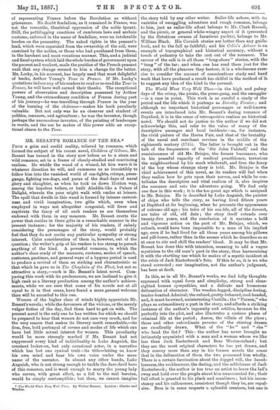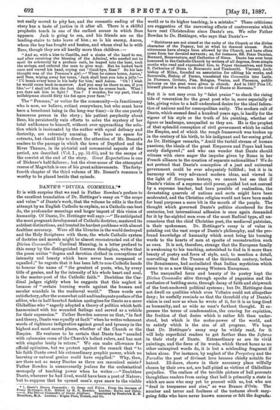MR. BESANT'S ROMANCE OF THE SEA.* Faom a grim and
sordid reality, relieved by romance, which formed the subject of his recent novel, Children of Gibeon, Mr. Besant has turned in the story now before us to a stern and wild romance, set in a frame of closely-studied and convincing realism. He wields the wand of a wizard, let him wave it in whatever direction he will, and summons us as irresistibly to follow him into the vanished world of sea-fights, crimps, press- gangs, fighting sea-dogs, and yarns of the dead days of naval glary and slaughter, as when be took us down Hoxton way, among the hopeless toilers, or built Aladdin-like a Palace of Delight, wherein the poor might walk with smiles at leisure. The spell that dwells in this wand is formed by intense earnest- ness and vivid imagination, two gifts which, even when employed in ways not altogether congenial, will force and captivate the fancy of all such readers as are themselves endowed with them in any measure. Mr. Besant exerts the power that resides in these gifts in a remarkable manner in the present instance ; for the majority of his readers, if calmly considering the personages of the story, would probably feel that they do not excite any particular sympathy or strong interest. Calm consideration of them is, however, out of the question; the writer's grip of his readers is too strong to permit anything of the kind. A powerful romance, in which the author's close study of the manners, customs, modes of speech, costumes, pastimes, and general ways of a bygone period is need to produce a revival of them as striking and characteristic as that which he gave us in The Chaplain of the Fleet, but not so attractive a story,—such is Mr. Besant's latest novel. Cora- paring this work with its predecessors, we are inclined to give it high rank as a literary production among the author's achieve- ments, while we are sure that some of his novels not at all equal to it in that sense, have found a more general welcome, than will be accorded to this one.
Women of the higher class of minds highly appreciate Mr. Besant's novels ; while the devourers of the vicious, or the merely vulgar fiction of the day, find them hard to get on with. The present novel is the only one be has written for which we should be prepared to hear that women do not care very much, and for the very reason that makes its literary merit remarkable,—its firm, free, bold portrayal of scenes and modes of life which can have but little actual interest for women. This peculiarity would be more strongly marked if Mr. Besant had not suppressed every kind of individuality in Luke Anguish, the constant looker-on, but only occasional actor, in a narrative which has but one cynical trait—its title—letting us know his own mind and hear his own voice under the mere name of the narrator. In almost any other hands, Luke Anguish, who is not strong enough to tackle the dare-devil hero of this romance, and is weak enough to marry the young lady who serves, with great effect, as a foil to the real heroine, would be simply contemptible; bat then, we cannot imagine
• The World Went Trery Well Then. By Walter Banat. London: Matte, and
the story told by any other writer. Sailor-life ashore, with its varieties of smuggling adventure and rough romance, belongs to him, just as sailor-life afloat belongs to Mr. Clark Russell, and the picnic, or general white-wingey aspect of it (presented by the flirtatious owners of luxurious yachts), belongs to Mr.. William Black. His Cornish stories are better than any guide- book, and to the full as faithful; and his Celia's Arbour is an example of topographical and historical accuracy, without a touch of pedantry to take the zest out of the romance. The savour of the salt is in all those " long-shore " stories, with the " tang " of the tar ; and when one has read them jest for the story, with all the pleasure they bestow, it is a wholesome nen cise to consider the amount of conscientious study and hard work that have produced a result too skilful in the method of it. to suggest any idea of the kind in the perusal.
The World Went Very Well Then—in the high and palmy days of the crimp, the pirate, the press-gang, and the smuggler —is a case in point. This work is as careful a study of the period and the life which it portrays as Dorothy Forster ; and although no important historical personages or wellanown events are introduced into Mr. Besant's daring romance of Deptford, it is in the sense of retrospective realism an historical novel We should not do justice to the author if we did not acknowledge this, and refer to the value of many of the descriptive passages and local incidents—as, for instance,. the vivid picture of the Horns Fair, and that of the brutality of the naval and merchant services in the middle of the eighteenth century (1745). The latter is brought out in the talk of the frequenters of the Sir John Falstaff,' and the reminiscences of old Mr. Brinjes, the former buccaneer, who in his peaoeful capacity of medical practitioner, terrorizes the neighbourhood by his mock witchcraft, and fires the fancy of the boy whose strange story is told. Mr. Brinjes is the chief achievement of this novel, as its readers will feel when they realise how he gets upon their nerves, and while he con- tributes the descriptive and vital realism of it, also inspires, the romance and sets the adventure going. We find only one flaw in this work ; it is the too great age which is assigned to Mr. Brinjes. He is described by Luke Anguish, the painter of ships who tells the story, as having lived fifteen years at Deptford at its beginning,, when he presents the appearance of extreme old age ; his tales of his sea-life, all of the fiercest, are tales of old, old date ; the story itself extends over twenty-five years, and the conclusion of it narrates a bold and vigorous action on the part of Mr. Brinjes, which, we submit, would have been impossible to a man of his implied age, even if he had lived for all those years among his pillows and pill-boxes, rather than in the scenes which he describes so as at once to stir and chill the readers' blood. It may be that Mr. Besant has done this with intention, meaning to add a vague mysticism to the old man's part in the story, thus harmonising it with the startling use which he makes of a mystic incident at the crisis of Jack Easterbrook's fate. If this be so, it is we who stand corrected ; our imagination, not the author's judgment, has been at fault.
In this, as in all Mr. Besant's works, we find lofty thoughts expressed with equal force and simplicity, strong and clear- sighted human sympathies, and a delicate and humorous delineation of character. The wooden-legged, discipline-loving, tender-hearted Admiral; the refined, pretty-behaved, cool-headed, and, it must be owned, uninteresting Castilla ; the " Parson," who plays so extraordinary a part in the story, and affords a striking instance of the author's ingenuity and artifice, because he fits perfectly into the plot, and also illustrates a curious phase of criminal life at the period; Aaron, the villain of the piece ; these and other subordinate persons of the stirring drama are excellently drawn. What of the " he " and " she" who head the list? This the author has never brought us intimately acquainted with a man and a woman whom we like less than Jack Eaaterbrook and Bess Westmoreland ; but they are the most original characters he has yet drawn, and they convey more than any in his former novels the sense that in the delineation of them the two possessed him wholly. There is a certain fascination about the dogged will, the daunt- 'Nanette, the recklessness, the daring, and the selfishness of Jack Easterbrook ; the author is too true an artist to leave the lad's sway and hold over the people about him unaccounted for ; their fall effect is granted to his pluck and manliness ; but his incon- stancy and his callousness, consistent though they be, are repul- sive, Bess is in some respects a splendid creature, but one is not easily moved to pity her, and the romantic ending of the story has a taste of justice in it after all. There is a skilful prophetic touch in one of the earliest scenes in which Bess appears. Jack is going to sea, and his friends are on the landing-stairs to take leave of him ; so is his enemy, Aaron, whom the boy has fought and beaten, and whose rival he is with Bess, though they are all hardly more than children :
And so, with a kiss to Castilla, and a shake of the hand to me, and after receiving the blessing of the Admiral, who needed not to spoil its solemnity by a profane oath, he leaped into the boat, took the strings, and ordered the men to give way. But he looked back once and waved his hand, crying out ' Good-bye, Bess!' Bo his last thought was of the Penman's girl.—' When he comes home, Aaron,' said Bess, wiping away her tears, ' Jack shall beat you into a jelly.'— 'I'll break every bone in his body for him,' said Aaron. ' Oh ! I wish he would come back to-morrow. And you may be there to see, if you like.'—' I shall tell him the first thing when he comes back. What ! you dare ask him to fight ? You ? I wonder, for my part, that a midshipman should dirty his flat upon your face.' "
The " Penman," or writer for the community—(a functionary who is now, we believe, extinct everywhere, but who must have been a beneficent being in the long-war time)—is the one purely humorous person in the story ; his patient perplexity about Bess, his persistently vain efforts to solve the mystery of her total unlikeness to himself, without ever approaching the solu- tion which is insinuated by the author with equal delicacy and dexterity, are extremely amusing. We have no space for extracts, but should like to direct the attention of Mr. Besant's readers to the passage in which the town of Deptford and the River Thames, in its pictorial and commercial aspects of the period, are described (Vol. L, pp. 51-65), and to the escape of the convict at the end of the story. Great Expectations is one of Dickens's half-failures; but the river-scene of the attempted rescue of Magwitch is one of his great achievements. The forty- fourth chapter of the third volume of Mr. Besant's romance is worthy to be placed beside that episode.



















































 Previous page
Previous page